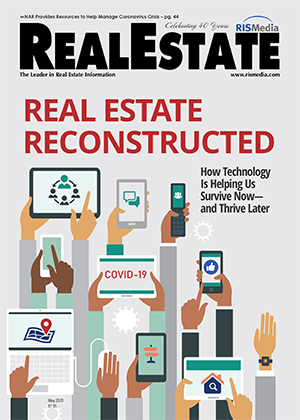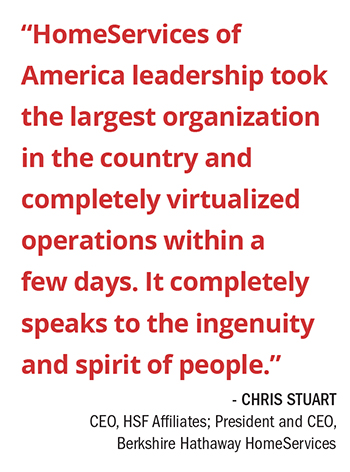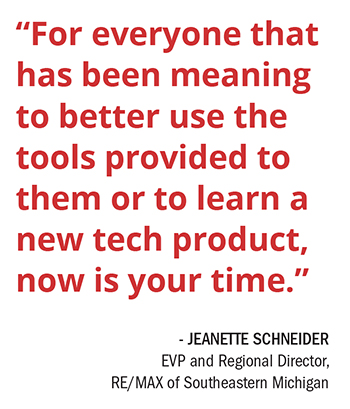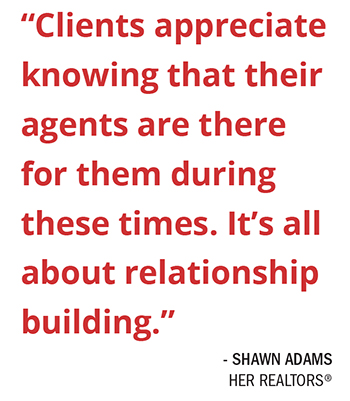 Editor’s note: The following is the May cover story for RISMedia’s Real Estate magazine.
Editor’s note: The following is the May cover story for RISMedia’s Real Estate magazine.
In early February, 2020 was shaping up to be a stellar year for real estate. Despite a stubborn inventory shortage, the housing market ramped up strongly. According to the National Association of REALTORS® (NAR), February home sales surged 7.2 percent year-over-year, hitting a pace of 5.77 million, and home prices rose 8 percent. Then the COVID-19 pandemic escalated in the U.S., and the landscape for real estate drastically changed—along with life as we knew it—in many parts of the country.
But despite the unprecedented impact of the virus, the world pivoted and businesses found a new way to operate and persevere, turning to technology in a way they never had before. According to the International Business Times, the now omnipresent video conferencing platform, Zoom, reported a 2,000-percent increase by mid-March. And as the masses began working from home, Microsoft reported a 775-percent increase in the use of its Cloud services, such as Windows Virtual Desktop.
Social media usage also skyrocketed in the wake of the coronavirus, emerging as a vehicle for accessing information and connecting while under stay-at-home restrictions. In a March 24 blog post, Facebook reported a 50-percent increase in total messaging. According to research by marketing firm IZEA, 66 percent of consumers expected their social media usage to increase during coronavirus confinement; and according to an April Flash Survey from the National Association of REALTORS®, 59 percent of REALTORS® are using social media to cultivate business virtually.
So while the world was already deepening its relationship with technology and social media, the COVID-19 pandemic has vaulted usage to a new level. Not surprisingly, real estate leaders are at the forefront of the evolution.
Pivot and Proceed
As Dan Forsman says, “It’s like we’re at war, but we’re in business.”
 At press time, Forsman, president and CEO of Berkshire Hathaway HomeServices Georgia Properties, was 26 days into his firm’s coronavirus crisis response. Like many of his peers across the country, the pandemic forced a complete shift in business operations for his 1,600 agents and 200 employees.
At press time, Forsman, president and CEO of Berkshire Hathaway HomeServices Georgia Properties, was 26 days into his firm’s coronavirus crisis response. Like many of his peers across the country, the pandemic forced a complete shift in business operations for his 1,600 agents and 200 employees.
“As dramatically and quickly as possible, I had a responsibility to change the way my company operated to get to the other side,” says Forsman. “But how do you send your whole team home and still operate a company of this size? I was surprised and shocked at how quickly everyone adapted.”
The lightning-fast adaptation that brokers like Forsman executed was necessary because, despite the vast and sobering impact of the virus, real estate transactions are still happening. According to HSF Affiliates CEO and Berkshire Hathaway HomeServices President and CEO Chris Stuart, that’s a testament to brokers being able to activate a virtual work environment quickly and effectively.
“HomeServices of America leadership took the largest organization in the country and completely virtualized operations within a few days,” says Stuart. “It completely speaks to the ingenuity and spirit of people, the essence of leadership and a great infrastructure…it’s pretty spectacular.”
Getting ahead of the impact of COVID-19 was critical, says Stuart, who assembled company leaders well in advance through a series of Town Halls. Together, they prepared and suggested a business continuity checklist for franchise network broker/owners, which included leveraging the tools a company already had in place, reviewing all expenses and looking at relief programs ahead of the stimulus package.
“There are a lot of approaches in adversity,” says Ken Baris, president of New Jersey-based Jordan Baris Inc., REALTORS® Real Living, which was founded in 1952. “My dad started the company, and he taught me it’s not about surviving—it’s about finding a way to thrive in any scenario. And that’s exactly what we’ve been doing.”
For leaders like Forsman, living through the housing crash of 2007 was proof positive that real estate could persevere through any crisis. “People learn how to do business in a different environment, as they’re doing now,” he explains. “We learned about social distancing. We developed Frequently Asked Questions, a fact sheet and showing protocols. I focused on helping people do business—not go home, get in a bunker and isolate.” Jeanette Schneider, executive vice president and regional director at RE/MAX of Southeastern Michigan, is leading her team through the particularly difficult impact of COVID-19. “In Michigan, real estate has been deemed a ‘non-essential’ business, and we are prohibited from meeting anyone in person,” she explains. “On the upside, deals in progress are still closing when both parties want to move forward, but new listings have dropped by about 80 percent. For those who have active buyers and sellers, you really can’t over-communicate with them, as things are changing hourly.”
Jeanette Schneider, executive vice president and regional director at RE/MAX of Southeastern Michigan, is leading her team through the particularly difficult impact of COVID-19. “In Michigan, real estate has been deemed a ‘non-essential’ business, and we are prohibited from meeting anyone in person,” she explains. “On the upside, deals in progress are still closing when both parties want to move forward, but new listings have dropped by about 80 percent. For those who have active buyers and sellers, you really can’t over-communicate with them, as things are changing hourly.”
As Stuart explains, communication in these times must be all about service. “We’ve changed the network’s messaging from ‘we’re the biggest real estate firm’ to ‘how can we help clients and neighbors?'” he explains. “As an organization, our network members are trying as best as possible to be sensitive to the realities while still being in a posture of service. People are still dealing with real estate transactions that are time-sensitive and need to go forward.”
Connecting Through Technology in a Time of Disconnection
In order to keep doing business, real estate professionals, from franchise heads to individual agents, are leaning into technology like they never have before.
“Now, in the new world, you have to make sure you have the leadership, presence, organization and communication structure to use technology in meaningful ways,” explains Stuart. “You have to take your existing collection of tools and use them in a new way.”
The pandemic’s call for social distancing has forced real estate leaders to find new ways to stay connected and visible with their employees and agents, and for agents to do the same with their clients and prospects. Technology and social media have emerged as the primary ways to do so.
Schneider calls it an “update-and-utilize” strategy. “For everyone that has been meaning to better use the tools provided to them or to learn a new tech product, now is your time,” she explains. “There has never been a better time to utilize the tools available to you.”
“Technology is important to our business, but now more than ever,” agrees HER REALTORS® President Shawn Adams. “With the stay-at-home order, technology allows our agents to continue conducting business for motivated buyers and sellers. It can be used in every aspect of the real estate transaction, from an initial consultation using Zoom or Google Meet to virtual open houses and curbside offers.”
Baris also said he was well-prepared thanks to his firm’s technological fortitude. The company quickly moved to increased Zoom meetings, paperless transactions and virtual showings. In-person showings are also still happening utilizing social distancing guidelines and protective gear like booties, masks and gloves.
 Forsman is also maximizing Zoom to stay “face-to-face,” offering 45-minute Zoom training sessions four times a day, personal meetings with his team three days a week, and a Town Hall with the entire company twice a week. During the first week of virtual operations, the company had 524 agents on Zoom training sessions. By the fourth week, there were 1,200.
Forsman is also maximizing Zoom to stay “face-to-face,” offering 45-minute Zoom training sessions four times a day, personal meetings with his team three days a week, and a Town Hall with the entire company twice a week. During the first week of virtual operations, the company had 524 agents on Zoom training sessions. By the fourth week, there were 1,200.
“From the start, we created an ongoing thread with new updates and messages in one place—similar to how the Associated Press updates developing stories,” says Lauren Kurtz, social media manager for California-based RE/MAX Gold. The firm’s brokers have also stepped up Zoom presentations and YouTube Live events. “These virtual meetings have been well attended, with about 500 agents tuning in to stay up-to-date,” she adds.
As Baris explains, agents should be utilizing technology in similar ways to connect with their spheres. “You have an absolute free pass right now to reach out to anyone you haven’t spoken to in a long time,” says Baris. “Get out there and connect with people, and only good things will happen.”
“You have to show empathy right now,” adds Forsman. “You don’t want to miss an opportunity—people will always be buying, and they’ll be buying through this. But agents need to change their tone and tenor. You need to be more relevant and more sensitive.”
Social Media: A Whole New Significance
Operating in the time of COVID-19 has created a call for real estate professionals to quickly improve their technology and communication skills.
Social media expertise, for example, is more important than ever as usage across social platforms skyrockets. “We’re leveraging social media as a conduit to get our content out to the folks we want to reach,” says Stuart. “That is so critical right now, and a huge opportunity for us to get better in this regard.”
 Fortuitously, Forsman was prepared with the right tools and the right training. “Three months ago, we signed a deal with MoxiWorks, which caused us to redo our agent intranet,” he shares. “Then along comes RISMedia’s ACESocial. I had my trainers actively engaged with my agents before all this, converting them to Moxi and ACE social media.”
Fortuitously, Forsman was prepared with the right tools and the right training. “Three months ago, we signed a deal with MoxiWorks, which caused us to redo our agent intranet,” he shares. “Then along comes RISMedia’s ACESocial. I had my trainers actively engaged with my agents before all this, converting them to Moxi and ACE social media.”
Adams is also using technology and social media to connect. “Our new technology platform provides agents with a means to connect with their entire database by email and text messages, allowing them to keep in touch with clients,” he explains. “Our adoption of the RISMedia ACESocial program has provided great content for sharing on social media.”
Providing automated, daily posts to agents’ Facebook, Twitter and LinkedIn sites, RISMedia’s ACESocial responded to the COVID-19 crisis by curating crisis-appropriate content and developing content specifically related to navigating the pandemic, such as advice for virtual showings and tips for working from home. ACESocial’s functionality also allows users to provide custom content. “It’s an opportunity for us to take our content in combination with ACE content and curate a better experience,” says Stuart.
According to Schneider, managing the daily changes and government programs related to COVID-19 is overwhelming. That’s why resources that provide relevant social media content are essential. “Trying to create or find informative content to continue to post to social may be even harder to do at this time, and this is where ACESocial can shine,” she explains. “Let ACE create the infographics, videos and articles that would take you a lot of hours to do on your own and leverage their material to make you the local expert.”
Automated platforms, like ACESocial, are helping to make agents’ social media presence stronger in a time when it needs to be. “Clearly, it’s evident by the number of people who are using it, that ACE is a very powerful tool,” says Stuart. “Any level of automation in any part of our business process is valuable. As an industry, it’s unfair how much we throw at agents who only have a limited amount of time.”
“Systems like ACE, or really any automated tools, are proving to be valuable in that they’re one less thing for agents to think about,” says Kurtz. “It’s easy to feel scatterbrained right now, with new information and updates each day, but having automated content means agents can check something off their list without even having to think about it.”
Baris agrees that automation is especially helpful at this time, as is keeping the right mix of content in front of consumers. “You need to be present consistently, and we use ACE because it gives us great content,” says Baris. “We alternate that with other content, such as a link to current inventory or an offer for a free property report.”
“This is not the time for pat-yourself-on-the-back social media,” he explains. “‘Look at me, I just sold a big house’ isn’t appreciated. You have to put information out there in a way that people can relate to and say, ‘this is valuable.'”
To that end, Adams is utilizing social media to help keep the public apprised of market conditions in Ohio and Northern Kentucky along with other messaging. “We find agents are looking for content to keep in touch, especially as it pertains to virtual transactions and keeping everyone safe,” adds Adams.
According to Schneider, agents should use social media right now to engage with their community. “If local restaurants are offering carry-out or delivery options, agents can bring this information to their followers on social,” she suggests. “Use your contacts and create a call to action, like reaching out to builders, developers or contractors to donate masks and other needed personal protection equipment to a local hospital. Agents can also provide much-needed information on the mortgage assistance available. Now is a great time to be a source of useful information and service to the community.”
Building New ‘Muscle Memory’
After witnessing virtually his entire network turn on a dime and revamp business operations in response to COVID-19, Stuart is left believing that level of responsiveness should become standard.
“For us, the whole paradigm of how we communicate and activate our network members has to change,” he says. “We want to be better communicators and be casting a bigger net in terms of what we’re doing for the network’s agents.” And for agents, this is causing them to develop important new skills in technology, video, social media and other ways of connecting. These skills, says Stuart, will be key in helping agents connect with their sphere post-crisis.
And for agents, this is causing them to develop important new skills in technology, video, social media and other ways of connecting. These skills, says Stuart, will be key in helping agents connect with their sphere post-crisis.
“There’s an incredible amount of lost opportunity in agents not staying in contact with past customers,” he says. “Now they’ll know how to give them more valuable communication with greater frequency. They’re developing new muscle memory.”
 “Going forward, utilizing technology that caters to consumers will be a new standard,” says Kurtz. “I think buyers will become accustomed to having the ability to ‘tour’ homes from the comfort of their own living room.”
“Going forward, utilizing technology that caters to consumers will be a new standard,” says Kurtz. “I think buyers will become accustomed to having the ability to ‘tour’ homes from the comfort of their own living room.”
“This has enhanced our agents’ skillset and raised our levels and variety of service, making us that much more valuable in the transaction,” agrees Adams. “Clients appreciate knowing that their agents are there for them during these times. It’s all about relationship building, trust and providing solutions to different scenarios. We hope that never changes.”
According to Baris, adapting due to the coronavirus has absolutely increased the skills and knowledge base of his team. “In our company, we’re going to see an increased volume of business because the infrastructure we’ve provided and having people’s total attention has been amazing.”
Operating through the coronavirus crisis will go a long way toward increasing the professionalism of agents, adds Forsman. “On the other side of this, we’ll have learned to be more effective and efficient. This is raising the bar of professionalism, and that may be the silver lining in this cloud.”
For more information, please visit rismedia.com and rismedia.com/acesocial.
 Maria Patterson is RISMedia’s executive editor. Email your real estate news ideas to maria@rismedia.com.
Maria Patterson is RISMedia’s executive editor. Email your real estate news ideas to maria@rismedia.com.












